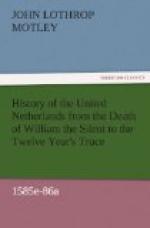That matter being adjusted, Parma’s probable attitude as King of England was examined. It was true his ambition might cause occasional uneasiness, but then he might make himself still more unpleasant in the Netherlands. “If your Majesty suspects him,” said the Commander, “which, after all, is unfair, seeing the way, in which he has been conducting himself—it is to be remembered that in Flanders are similar circumstances and opportunities, and that he is well armed, much beloved in the country, and that the natives are of various humours. The English plan will furnish an honourable departure for him out of the Provinces; and the principle of loyal obligation will have much influence over so chivalrous a knight as he, when he is once placed on the English throne. Moreover, as he will be new there, he will have need of your Majesty’s favour to maintain himself, and there will accordingly be good correspondence with Holland and the Islands. Thus your Majesty can put the Infanta and her husband into full possession of all the Netherlands; having provided them with so excellent a neighbour in England, and one so closely bound and allied to them. Then, as he is to have no English children” (we have seen that the Commander had settled that point) “he will be a very good mediator to arrange adoptions, especially if you make good provision for his son Rainuccio in Italy. The reasons in favour of this plan being so much stronger than those against it, it would be well that your Majesty should write clearly to the Prince of Parma, directing him to conduct the enterprise” (the English invasion), “and to give him the first offer for this marriage (with Queen Mary) if he likes the scheme. If not, he had better mention which of the Archdukes should be substituted in his place.”
There happened to be no lack of archdukes at that period for anything comfortable that might offer—such as a throne in England, Holland, or France—and the Austrian House was not remarkable for refusing convenient marriages; but the immediate future only could show whether Alexander I. of the House of Farnese was to reign in England, or whether the next king of that country was to be called Matthias, Maximilian, or Ernest of Hapsburg.
Meantime the Grand Commander was of opinion that the invasion-project was to be pushed forward as rapidly and as secretly as possible; because, before any one of Philip’s nephews could place himself upon the English throne, it was first necessary to remove Elizabeth from that position. Before disposing of the kingdom, the preliminary step of conquering it was necessary. Afterwards it would be desirable, without wasting more time than was requisite, to return with a large portion of the invading force out of England, in order to complete the conquest of Holland. For after all, England was to be subjugated only as a portion of one general scheme; the main features of which were the reannexation of Holland and “the islands,” and the acquisition of unlimited control upon the seas.




